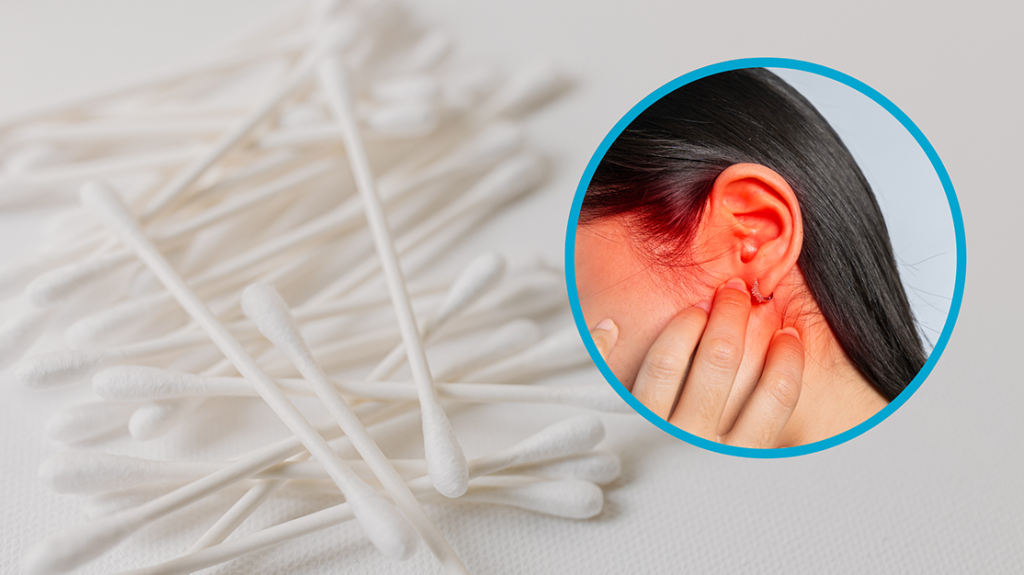
Can I Clean My Own Ears?
Dr. Ronna Fisher | Ask the Audiologist
You get out of the shower or start getting ready for the day, and you see a Q-tip on your counter. Next thing you know, it’s swirling around in your ear, only to make things muffled or hard to hear.
It’s pretty standard for patients to think they can clean their own ears, but unfortunately, it often leads to a pretty bad experience.
Let’s take a look at some of the most common earwax cleaning myths and why you should work with an audiologist the next time you think you might have too much earwax.
Why Do I Have Earwax?
EWWW…EARWAX! DISGUSTING!
Why is everyone so grossed out by earwax?
Well, for one, it looks gross. It’s brown, greenish, gunky and sometimes gooey and sticky. Just seeing it can make you feel unclean and in need of hygiene.
But get over it! Everyone has earwax.
And, it’s a good thing you do, or you’d be in a lot of trouble.
There’s a reason you have earwax. It creates a waterproof lining in your ears that keeps them dry, which prevents germs and bacteria from causing constant infections.
Earwax traps dirt and dust, and little pieces of cotton (from those nasty Q-tips), and all the stuff that gets stuck in the hairspray you accidentally sprayed in your ears.
Wax keeps your ears lubricated and repels fungi, insects, and water.
Earwax has a purpose. It protects your ears.
Are There Different Kinds of Earwax?
Having too little earwax or over-cleaning your ears can cause dry, flaky, and itching ears and trigger infections.
Some wax is dry and flaky, and some wax is gooey and sticky. What kind you have is basically genetic. In general, Asians have dry earwax while European and African populations produce “wet” earwax.
Should I Clean My Own Ears?
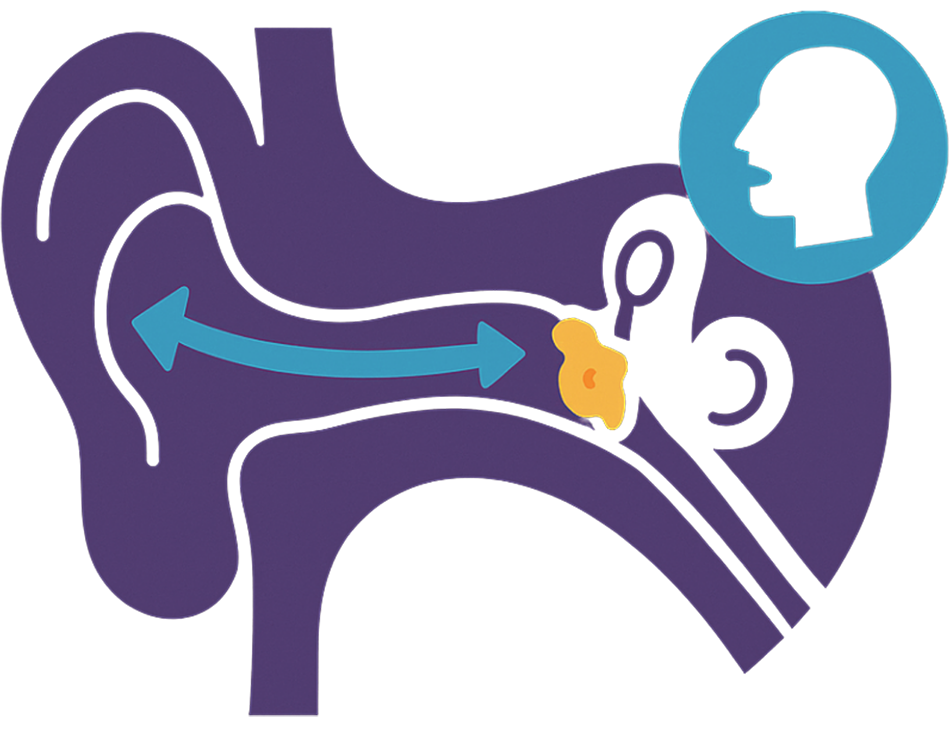
GET THAT Q-TIP, BOBBY PIN, PEN KNIFE, SAMURAI SWORD OUT OF YOUR EAR!
Most ears are self-cleaning. Every time you chew or talk, the movement of your jaw causes the dusty, germ-laden wax to be pushed toward the opening of your ear, where it usually flakes and falls out. Meanwhile, the glands in your ear canals are producing new, protective, fresh wax.
When you stick objects in your ear, you’re really not helping. You’re pushing all the wax deeper into the canal and causing it to keep building up. Then the wax gets impacted.
- You get hearing loss
- You get an earache
- You get tinnitus (ringing in your ear)
- Your ears itch
- Your ears smell bad
- You puncture your eardrum
5 Things That Can Cause Excessive Earwax Build-Up
There are five main reasons why you might have excessive earwax. Some of these are things you can control, whereas others are just part of our genetics.
- The number one cause of excessive wax buildup is self-cleaning attempts.
- Genetics – some people just produce too much. It runs in the family
- Headphones*
- Hearing aids*
- Age – the ears produce less moisture, and the ear canals can narrow, causing the dry wax to get stuck.
*Your ears need to breathe and get air. Wearing headphones and using hearing aids can block the ears from performing their natural self-processing.
Common Earwax Cleaning Myths
We get patients every day who tell us about something they’ve heard online, or from a friend about cleaning their ears. Next thing you know, they tried something, and it made everything worse.
Here are some of the most common earwax cleaning myths we’ve heard:
Myth: Ear candling is a safe and effective way to remove earwax and toxins.
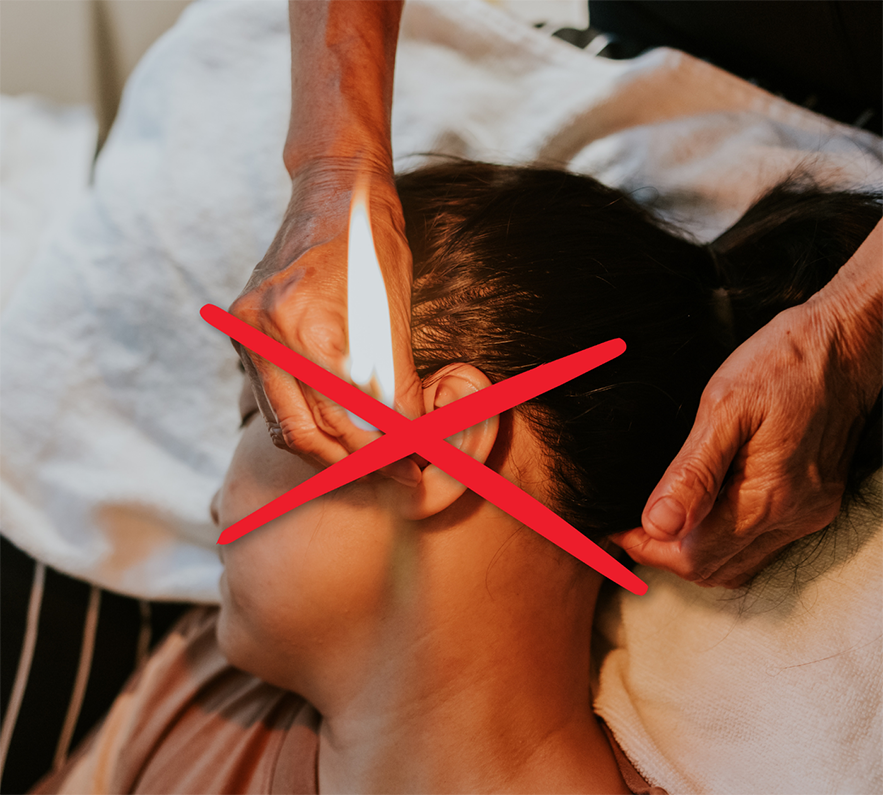
Ear candling, or ear coning, involves placing a lit, hollow candle into the ear canal, with the belief that it creates suction to draw out earwax and impurities.
Medical experts and scientific studies have consistently debunked this practice as both ineffective and highly dangerous.
It does not remove earwax; instead, it can lead to severe burns, introduce candle wax into the ear canal, cause ear infections, or even puncture the eardrum.
The residue found in candles after use is typically just candle wax and soot, not earwax.
Myth: You should clean your ears daily to maintain good hygiene.
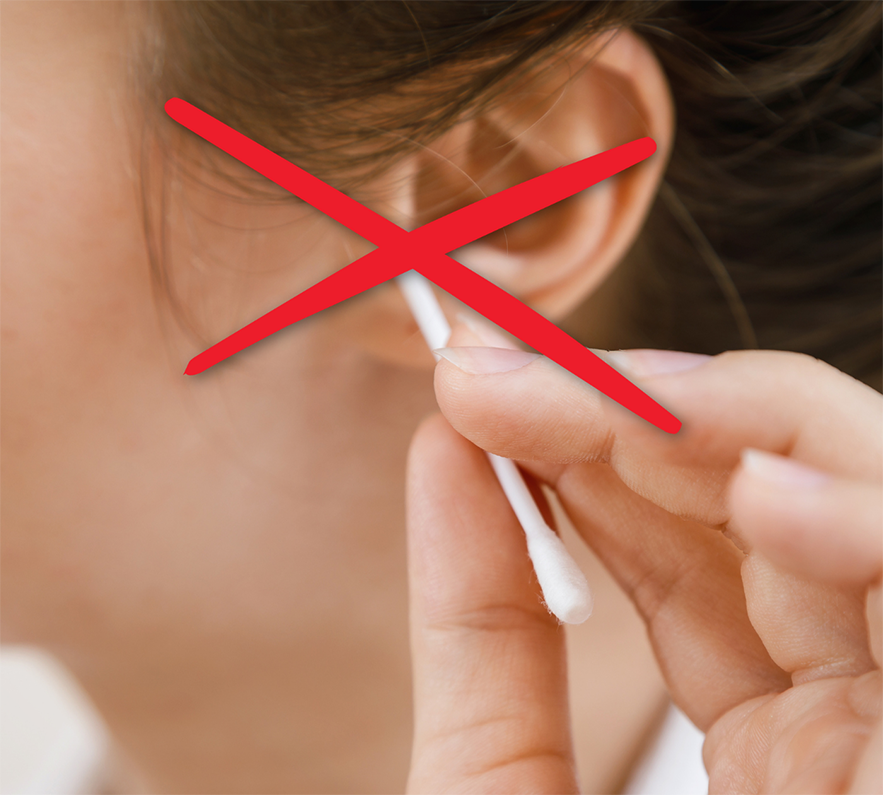
While it’s important to keep the outer ear clean, the inner ear canal is remarkably self-cleaning.
Your ears are designed with a natural “conveyor belt” system, where old earwax is gradually moved out of the ear canal through jaw movements (like chewing and talking).
Attempting to clean your ears daily, especially by inserting objects, can disrupt this natural process, push wax deeper, and cause more problems than it solves.
For most people, simply wiping the outer ear with a damp cloth is sufficient.
Myth/Fact: Over-the-counter ear drops are a universal solution for all earwax problems.
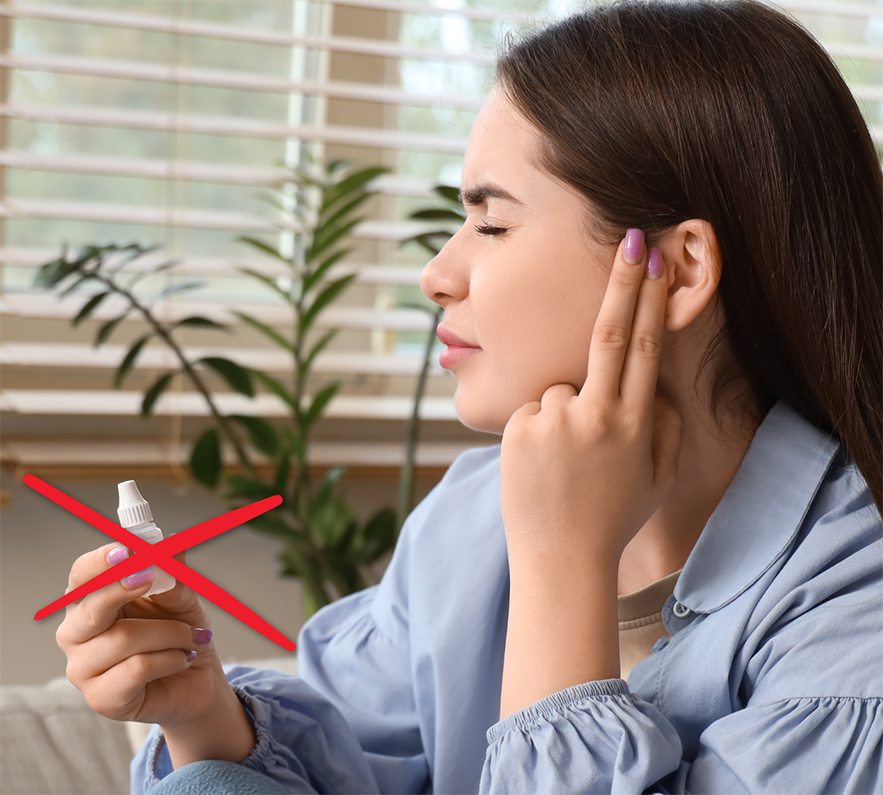
Ear drops can help soften earwax, which can aid in its natural expulsion or make professional removal easier.
Many over-the-counter drops contain ingredients like hydrogen peroxide or carbamide peroxide that work to break down earwax.
However, they are not a universal solution.
Ear drops should be used with caution and often under the guidance of a healthcare professional, especially if you suspect you have a perforated eardrum, an ear infection, or ear tubes.
For significant or impacted earwax, drops alone are usually not enough, and professional removal by an audiologist or doctor remains the safest and most effective method.
Cleaning Your Ears Isn’t a DIY Project. Call Hearing Health Center Today to Get Your Ears Cleaned Today.
Cleaning your ears isn’t a do-it-yourself project. Even if you use an over-the-counter remedy, how do you know if it worked? You can’t see what you’re doing in there.
If you think you have earwax buildup, do NOT try to fix it yourself. Your audiologist or doctor can remove it quickly, easily, comfortably, and professionally.
Schedule an appointment with one of our audiologists at Hearing Health Center for a comprehensive hearing exam and be on your way to better hearing.
About the Author:
Recent Posts
- How to Keep a Little Hearing Loss from Becoming a Big Deal
- What Untreated Hearing Loss Costs You
- EXTRA, EXTRA: Dr. Ronna Fisher Made the Cover
- Flex Benefits, Health Savings Accounts, and Insurance Coverage for Hearing
- Medicare Made Easy… Should You Switch Plans?
- Untreated Hearing Loss Can Be Devastating
- How Do I Clean My Hearing Aids?
-
Downtown Chicago
Magnificent Mile
142 E. Ontario St, Ste 1100
 (312) 263-7171
Learn More
(312) 263-7171
Learn More
-
Naperville
Fox Run Square
1212 S. Naper Blvd, Ste 103
 (630) 369-8878
Learn More
(630) 369-8878
Learn More
-
Oak Brook
Oakbrook Prof. Bldg.
120 Oakbrook Ctr, Ste 709
 (630) 571-7111
Learn More
(630) 571-7111
Learn More
-
Highland Park
Crossroads Shopping Cntr.
185 Skokie Valley Rd.
 (847) 681-7000
Learn More
(847) 681-7000
Learn More
-
Park Ridge
Presence Resurrection
7447 W. Talcott Ave, Ste 360
 (773) 466-8878
Learn More
(773) 466-8878
Learn More
